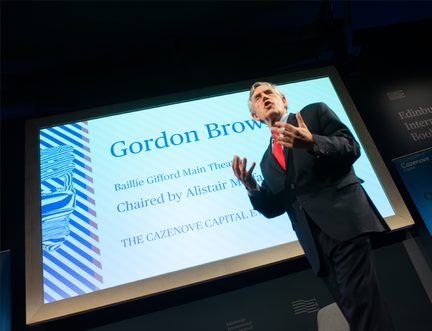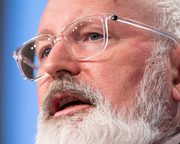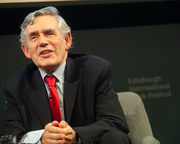More articles Thursday 16 August 2018 10:00am
Gordon Brown: Corbyn must change approach to anti-semitism

Jeremy Corbyn has to change what he’s saying about anti-semitism in his party, according to former Labour Prime Minister Gordon Brown. “I’m one of many people who is pressing for this change and I believe that it will change, but even that will not be enough,” he said yesterday in his event at the Book Festival.
“You have got to show by your actions, and not simply by your statements and words, that you understand the deep hurt that has been caused. I’m very clear about that.”
The former Prime Minister and Chancellor of the Exchequer was in Edinburgh to discuss his book My Life, Our Times, and spoke a lot about the political changes since he departed Downing Street in 2010.
“We have a problem in Britain; not just with Islamaphobia, and not just with racism against the black community,” he said. “We have a problem within the Labour Party with anti-semitism, and it has got to be dealt with. It’s absolutely central to the progress of a democratic society that is tolerant and liberal, that a party like the Labour Party comes out strongly against any anti-semitism in its ranks.”
Moving on, he described the result of the Brexit vote and the election of Donald Trump as obvious symptoms of a genuine reaction to “the speed and the scale and the scope of the global changes that have been wrought in the last 20 and 30 years.”
“What happened is three things: one is economic discontent, because there’s been a restructuring of the world, and the losers feel that they’re going to continue to lose from globalisation.
“Globalisation raises a question of who we are, because we’re no longer homogeneous societies as we used to be; there’s large-scale movements of people, and it raises inevitably questions of culture and identity and what your country is all about and what it stands for.
“And it also raises questions of control; because the nation state is not in full control of events which are global, which depend on realising we’re interdependent which require action taken internationally.
“You cannot recreate a wholly independent nation state in a world that is inter-dependent,” he said. “You’ve got to work with other countries and get the balance right between the autonomy you desire and the co-operation you need.”
Asked by an audience-member to “apologise” for the creation of the Scottish Parliament, Brown instead used it as an example of finding the balance between “respect for identity and co-operation.”
“I don’t apologise for the creation of the Scottish Parliament,” he responded, to general applause. “I think we’re respecting national identity and making decisions closer to home but, at the same time, we’re not ruling about the process of co-operation, so we can pull and share our resources which makes it possible for us to finance the National Health Service, child benefits and other things as well.
“Personally, I’d like to see the Scottish Parliament have more powers, but see it staying within the United Kingdom; if there was another [Scottish Independence] Referendum, then I would be fighting for the positive approach of a Scottish Parliament with more powers but within the United Kingdom.”
Look, Listen & Read
- 2025 Festival:
- 9-24 August
Latest News
 Communities Programme participants celebrate success of 2024
Communities Programme participants celebrate success of 2024





